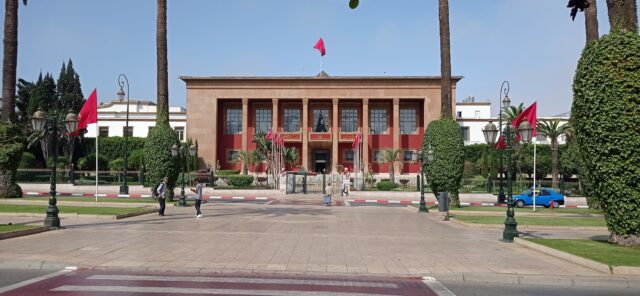Morocco: A SWOT Analysis

Geopolitical Report ISSN 2785-2598 Volume 41 Issue 24
SpecialEurasia OSINT Team
Executive Summary
Morocco, positioned at the northwestern edge of Africa, operates under a stable constitutional monarchy with the king wielding significant political power. Despite ongoing pressures from Islamist and pro-democracy movements, the regime’s promotion of moderate Islam fosters internal stability.
However, unresolved tensions over the Western Sahara dispute periodically spark clashes with neighbouring Algeria. Despite the encouragement of foreign investment, the government still faces rampant corruption alongside challenges of unemployment, poverty, and low education rates.
The country maintains a relatively low terrorist threat through robust anti-terror measures, though petty crime poses risks, particularly in tourist areas. Road safety concerns persist, exacerbated by inadequate infrastructure in rural regions and seasonal weather hazards.
While major cities boast adequate infrastructure and medical services, safety concerns loom in remote locales, compounded by the nation’s susceptibility to earthquakes.
Geopolitics of Morocco
In recent years, Morocco’s geopolitical landscape has shifted significantly, marked by an assertive foreign policy and strategic alliances with influential global powers like the United States and Israel. These recalibrations have not only bolstered Morocco’s stature regionally and internationally but have also delineated the contours of its diplomatic aspirations and impact on the global stage.
Strategic alliances with the United States and Israel constitute a pivotal component of Morocco’s developing geopolitical trajectory. These alliances have facilitated substantial military cooperation, including aid, training programs, and access to innovative military technologies. Consequently, Morocco has fortified its strategic position and augmented its defence capabilities across various domains, underscoring its stance in safeguarding national interests.
In parallel with its diplomatic endeavours, Morocco has made significant strides in domestic development, with a particular emphasis on economic modernisation. This strategy includes positioning the country for the imminent Green Revolution, which is evident through the efforts to extend its continental shelf to cover the Tropic seamount.
This strategic manoeuvre aims to unlock potential resources critical for emerging industries, such as electric vehicles and solar energy, signifying Rabat’s engagement with future-oriented economic paradigms.
SWOT Analysis
Strengths
- Political Stability. Morocco maintains a stable political environment under a constitutional monarchy, providing a framework for consistent governance despite periodic social unrest.
- Diversified Economy. The economy benefits from diverse sectors such as tourism, agriculture, manufacturing, and phosphate mining, reducing dependence on any single industry.
- Robust Anti-Terrorism Framework. Morocco has established effective anti-terrorism measures, evidenced by frequent arrests of suspected militants and thwarting of terror plots, enhancing security for citizens and visitors.
- Strategic Location. At the crossroads of Africa, Europe, and the Middle East, Morocco enjoys strategic positioning for trade and investment, facilitating its role as a regional economic hub.
- Cultural Richness and Tourism Potential. The country’s rich cultural heritage, blending Arab, European, Berber, and African influences, alongside its diverse landscapes, attract millions of tourists annually, contributing significantly to the economy.
Weaknesses
- High Unemployment and Poverty. Persistent unemployment, particularly among youth, and widespread poverty remain significant challenges, leading to social discontent and periodic unrest.
- Corruption Concerns. Endemic corruption in various sectors poses a challenge to governance and deters foreign investment, despite ongoing anti-corruption efforts and legislation.
- Reliance on Agriculture. The agricultural sector, vulnerable to climatic fluctuations, remains a crucial source of livelihood for many Moroccans, exposing the economy to risks from adverse weather conditions.
- Limited Infrastructure in Rural Areas. Although urban and tourist infrastructure is well-established, rural areas face significant challenges because of inadequate infrastructure, affecting accessibility and development in remote regions.
- Political Constraints on Civil Liberties. Despite gradual reforms, political power remains centralised with the monarchy, constraining civil liberties and limiting the influence of elected bodies.
Opportunities
- Renewable Energy Investments. Rabat’s commitment to tripling investment in renewable energies presents opportunities for economic growth, technological innovation, and environmental sustainability.
- Infrastructure Development. Continued investment in infrastructure, particularly in rural areas, can enhance connectivity, stimulate economic activity, and improve living standards for marginalised communities.
- Diversification of Economy. Further diversification of the economy beyond traditional sectors like agriculture and tourism can reduce vulnerability to external shocks and foster long-term sustainable growth.
- Regional Cooperation. Strengthening regional partnerships and cooperation initiatives can enhance trade opportunities, promote stability, and address common challenges such as terrorism and migration.
- Investment in Human Capital. Investing in education, skills training, and healthcare can address socio-economic disparities, improve productivity, and unlock the full potential of Morocco’s workforce.
Threats
- Terrorism and Security Risks. Despite effective anti-terrorism measures, the persistent threat of terrorism, both domestic and regional, poses risks to public safety, tourism, and investor confidence.
- Regional Instability. Tensions with the Polisario Front and neighbouring Algeria over the Western Sahara dispute, along with periodic civil unrest, can escalate into regional conflicts, disrupting stability and economic activities.
- Climate Change and Natural Disasters. Morocco’s susceptibility to climate change impacts, including droughts, floods, and earthquakes, poses risks to agricultural productivity, infrastructure, and livelihoods, necessitating adaptation measures.
- Economic Vulnerabilities. External factors such as global commodity prices, trade disruptions, and fluctuations in tourism demand can adversely affect Morocco’s economy, exacerbating fiscal deficits and debt burdens.
- Governance Challenges. Persistent governance challenges, including corruption, political centralisation, and limited civil liberties, undermine social cohesion, weaken institutions, and hinder inclusive development efforts.
Conclusion
Morocco exhibits strengths in political stability, economic diversification, and cultural richness, which, when leveraged effectively, can drive sustainable development and prosperity. However, addressing weaknesses such as high unemployment, corruption, and infrastructure deficits requires concerted efforts.
By seizing opportunities in renewable energy, infrastructure development, and regional cooperation, Morocco can navigate through threats posed by terrorism, regional instability, and climate change, to emerge as a resilient and prosperous nation in the North African region.
Listen also | Ep.6 – Geopolitics and Democracy in Africa: A Conversation with Kaitlyn Rabe |
If you need more information, reports, and risk assessments of Morocco, you can reach us at info@specialeurasia.com.
